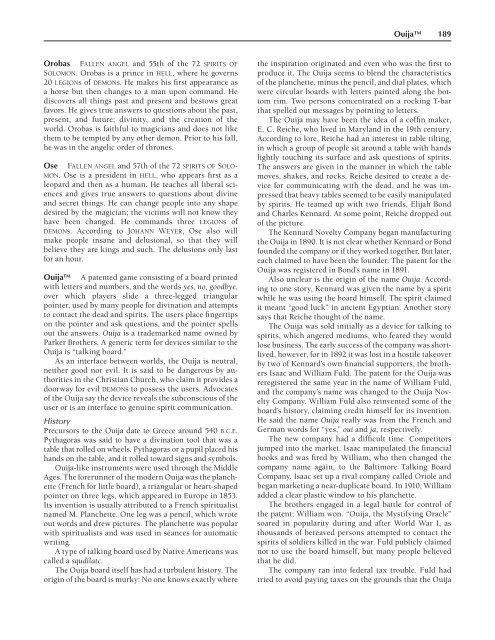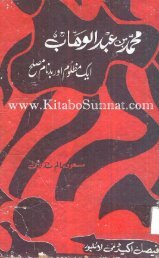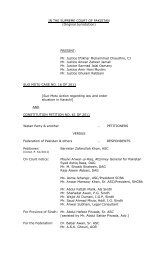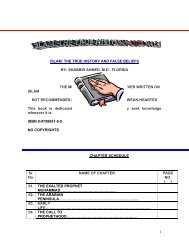The Encyclopedia Of Demons And Demonology
The Encyclopedia Of Demons And Demonology
The Encyclopedia Of Demons And Demonology
You also want an ePaper? Increase the reach of your titles
YUMPU automatically turns print PDFs into web optimized ePapers that Google loves.
Ouija 189<br />
Orobas FALLEN ANGEL and 55th of the 72 SPIRITS OF<br />
SOLOMON. Orobas is a prince in HELL, where he governs<br />
20 LEGIONs of DEMONs. He makes his first appearance as<br />
a horse but then changes to a man upon command. He<br />
discovers all things past and present and bestows great<br />
favors. He gives true answers to questions about the past,<br />
present, and future; divinity, and the creation of the<br />
world. Orobas is faithful to magicians and does not like<br />
them to be tempted by any other demon. Prior to his fall,<br />
he was in the angelic order of thrones.<br />
Ose FALLEN ANGEL and 57th of the 72 SPIRITS OF SOLO-<br />
MON. Ose is a president in HELL, who appears first as a<br />
leopard and then as a human. He teaches all liberal sciences<br />
and gives true answers to questions about divine<br />
and secret things. He can change people into any shape<br />
desired by the magician; the victims will not know they<br />
have been changed. He commands three LEGIONs of<br />
DEMONs. According to JOHANN WEYER, Ose also will<br />
make people insane and delusional, so that they will<br />
believe they are kings and such. <strong>The</strong> delusions only last<br />
for an hour.<br />
Ouija A patented game consisting of a board printed<br />
with letters and numbers, and the words yes, no, goodbye,<br />
over which players slide a three-legged triangular<br />
pointer, used by many people for divination and attempts<br />
to contact the dead and spirits. <strong>The</strong> users place fi ngertips<br />
on the pointer and ask questions, and the pointer spells<br />
out the answers. Ouija is a trademarked name owned by<br />
Parker Brothers. A generic term for devices similar to the<br />
Ouija is “talking board.”<br />
As an interface between worlds, the Ouija is neutral,<br />
neither good nor evil. It is said to be dangerous by authorities<br />
in the Christian Church, who claim it provides a<br />
doorway for evil DEMONs to possess the users. Advocates<br />
of the Ouija say the device reveals the subconscious of the<br />
user or is an interface to genuine spirit communication.<br />
History<br />
Precursors to the Ouija date to Greece around 540 B.C.E.<br />
Pythagoras was said to have a divination tool that was a<br />
table that rolled on wheels. Pythagoras or a pupil placed his<br />
hands on the table, and it rolled toward signs and symbols.<br />
Ouija-like instruments were used through the Middle<br />
Ages. <strong>The</strong> forerunner of the modern Ouija was the planchette<br />
(French for little board), a triangular or heart-shaped<br />
pointer on three legs, which appeared in Europe in 1853.<br />
Its invention is usually attributed to a French spiritualist<br />
named M. Planchette. One leg was a pencil, which wrote<br />
out words and drew pictures. <strong>The</strong> planchette was popular<br />
with spiritualists and was used in séances for automatic<br />
writing.<br />
A type of talking board used by Native Americans was<br />
called a squdilatc.<br />
<strong>The</strong> Ouija board itself has had a turbulent history. <strong>The</strong><br />
origin of the board is murky: No one knows exactly where<br />
the inspiration originated and even who was the first to<br />
produce it. <strong>The</strong> Ouija seems to blend the characteristics<br />
of the planchette, minus the pencil, and dial plates, which<br />
were circular boards with letters painted along the bottom<br />
rim. Two persons concentrated on a rocking T-bar<br />
that spelled out messages by pointing to letters.<br />
<strong>The</strong> Ouija may have been the idea of a coffin maker,<br />
E. C. Reiche, who lived in Maryland in the 19th century.<br />
According to lore, Reiche had an interest in table tilting,<br />
in which a group of people sit around a table with hands<br />
lightly touching its surface and ask questions of spirits.<br />
<strong>The</strong> answers are given in the manner in which the table<br />
moves, shakes, and rocks. Reiche desired to create a device<br />
for communicating with the dead, and he was impressed<br />
that heavy tables seemed to be easily manipulated<br />
by spirits. He teamed up with two friends, Elijah Bond<br />
and Charles Kennard. At some point, Reiche dropped out<br />
of the picture.<br />
<strong>The</strong> Kennard Novelty Company began manufacturing<br />
the Ouija in 1890. It is not clear whether Kennard or Bond<br />
founded the company or if they worked together. But later,<br />
each claimed to have been the founder. <strong>The</strong> patent for the<br />
Ouija was registered in Bond’s name in 1891.<br />
Also unclear is the origin of the name Ouija. According<br />
to one story, Kennard was given the name by a spirit<br />
while he was using the board himself. <strong>The</strong> spirit claimed<br />
it meant “good luck” in ancient Egyptian. Another story<br />
says that Reiche thought of the name.<br />
<strong>The</strong> Ouija was sold initially as a device for talking to<br />
spirits, which angered mediums, who feared they would<br />
lose business. <strong>The</strong> early success of the company was shortlived,<br />
however, for in 1892 it was lost in a hostile takeover<br />
by two of Kennard’s own financial supporters, the brothers<br />
Isaac and William Fuld. <strong>The</strong> patent for the Ouija was<br />
reregistered the same year in the name of William Fuld,<br />
and the company’s name was changed to the Ouija Novelty<br />
Company. William Fuld also reinvented some of the<br />
board’s history, claiming credit himself for its invention.<br />
He said the name Ouija really was from the French and<br />
German words for “yes,” oui and ja, respectively.<br />
<strong>The</strong> new company had a difficult time. Competitors<br />
jumped into the market. Isaac manipulated the financial<br />
books and was fired by William, who then changed the<br />
company name again, to the Baltimore Talking Board<br />
Company. Isaac set up a rival company called Oriole and<br />
began marketing a near-duplicate board. In 1910, William<br />
added a clear plastic window to his planchette.<br />
<strong>The</strong> brothers engaged in a legal battle for control of<br />
the patent; William won. “Ouija, the Mystifying Oracle”<br />
soared in popularity during and after World War I, as<br />
thousands of bereaved persons attempted to contact the<br />
spirits of soldiers killed in the war. Fuld publicly claimed<br />
not to use the board himself, but many people believed<br />
that he did.<br />
<strong>The</strong> company ran into federal tax trouble. Fuld had<br />
tried to avoid paying taxes on the grounds that the Ouija












